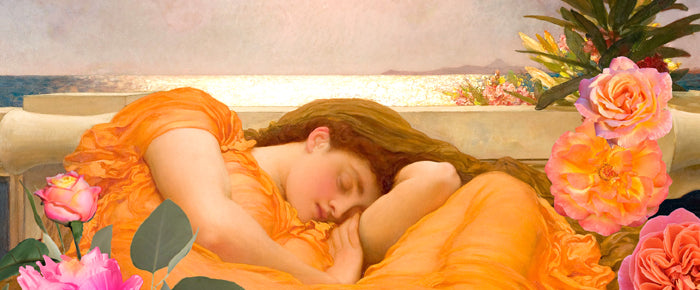In the cemetery of Catania, Sicily, a beautiful girl lies in a crystal coffin, covered in flowers and still wearing the same wedding gown and hairdo as 100 years ago. She is a mummy and her name is Angelina, or better known to the locals as La Bella Addormentata, the Sleeping Beauty.
Angelina Mioccio died in 1911, jumping off the tower of the castle that her father was building for her as a wedding gift. In the best traditions of the time, the marriage had been arranged with a good party, a lawyer over twenty years older than her. To no avail she tried to stop the marriage, until the fatal decision.
A poem written for her says:
"Tu si na fata
Pricchi frimmasti u tempu
nta la cchiu bedda eta': a giuvinizza"
"You are a fairy
Because you stopped time
in the most beautiful age: youth"
The girl of the Belle Époque
Angelina grew up in the high society of Southern Italy, her father being the rich owner of one of the biggest European factories for the tanning of hides. Their palazzo (mansion) was located right in the heart of the city where the girl, always accompanied by her mother and sisters, could walk to the most exclusive boutiques, like the bottega of the famous French couturier Colontier.
Despite hers was a life of privilege, there were many things that Angelina couldn't do. For example, while her brothers attended school, Angelina and her sisters were only allowed basic home lessons, like learning how to read and make calculations for household bookkeeping. She found these lessons tedious, but even more dull were the long sessions of sewing and instructions on good manners. "Grace and obedience", as her father often used to say, were the goals of a good education for women.
The year that Angelina turned 16, she was finally allowed to follow her parents for evening visits to friends and relatives, or outings to the theater ̶ before that age, Southern girls were required to stay at home supervised by their servants.

That same year, a historical event took place in Catania: the Universal Expo of 1907. All the Italian nobility came to the inauguration, following King Vittorio Emanuele. Also Angelina was present at the event because her father was one of the organizers. Among the notables who kissed her hand that night, unbeknownst to her, there was also the lawyer she had already been promised to.
A young Love
Unaware of the promise that had been made of her behalf, Angelina was living her life with the lightheartedness and the dreams typical of all youth. When a distant cousin of her mother came to town with her son Alfio, for a moment Angelina's eyes came in contact with the dark eyes of the boy. Angelina felt shy and excited at the same time, a sensation she had never experienced before. Then she felt sad when, the day after, her mom talked about the misfortune that had befallen on her cousin and her son. The smart kid, she said, had to leave University after his father died, and was now scrambling to support his mother. "But we can help...", cried Angelina, trying to self-contain her emotions for fear they could be visible. "I am not going to embarrass my cousin with our lifestyle!", firmly replied the mother. "After all, it was my cousin's choice to make a low marriage. Now love doesn't feed her and her son, does it?"
At this point, Angelina had lost all hope to see Alfio again. But then, a couple months later, the boy was finally hired by her father as an accountant in the family factory. Angelina was ecstatic and didn't miss any opportunity to visit her father's office, often electing to do small errands just to see the boy. She was right, her feelings were mutual and quickly grew into something important. Soon, Alfio promised to talk to her father and ask for her hand in marriage, sure of a positive answer considering all the praises he received at work.
Two years passed like this, between handwritten notes and the sweet promise of a life together. Until the day Angelina turned eighteen.
❦❦❦
For Love and for Protest
Salvatore, the lawyer who was now in his forties, had patiently waited for this day. And like those people who have never understood love, he never questioned if the girl was happy. Her father's word was all that he needed, and soon they discussed the dowry, the money, the house. Angelina's father proudly disclosed the purchase of a big piece of land, along with his project to build the most magnificent castle Catania had ever seen.
That night, and for the many nights that followed, Angelina cried and cried. Until one day she found the courage to approach her mother and confess her love for Alfio and their plans for the future. But her mother hastily silenced her, commanding that she never dare saying a word to her father.
Angelina was devastated. But there was still one last hope, Alfio, who would surely talk to her father and ask for her hand in marriage. And perhaps, this would have happened if a series of circumstances had been different. It could have happened, for example, if the wedding announcement had not taken place in front of all the factory workers. Also Alfio, with a bitter mouth, had to drink from the special bottle opened for the occasion. It could have happened, perhaps, if Alfio had never experienced hardship, or if he didn't have a mother to support. But Alfio did not find the courage to step forward, and this was for Angelina even more painful than the arranged marriage. After all, little did she know of the necessity to work and survive because her heart only knew of love.
The wedding dress fittings started soon after, with the seamstress constantly having to narrow down the waist and the chest of the gown. Angelina, in fact, was not eating anymore. And also the castle progressively took shape, with the father proudly calling it "the envy of the people".
That castle, however, would have never witnessed a fairytale. One ordinary day, at the age of nineteen, Angelina jumped off the tower. She did it for love and for protest.

Forever young
After her death, Angelina was once again trapped by her father's will. This time, trapped into a body destined to remain young forever. Her father, in fact, ordered the body to be embalmed and fashioned as a bride, with the same wedding gown and hairstyle she was supposed to wear the day of her wedding. Then, he ordered that her body be placed inside a crystal coffin, which was secretly transported inside the family mausoleum at the cemetery. Nobody, in the city, had to know what had happened, since suicide was considered a great dishonor. A sudden illness, they said to the people, was the cause of her death. To keep it a secret, a special wooden panel was placed in front of the coffin, which could be lifted up during family visits.
The years passed, and then the years became decades. Forever young Angelina, the sleeping beauty, saw everybody age but herself. Then, as soon as her parents died, she was forgotten. It was too shameful, for her siblings, to talk about the deceased aunt to their own kids. Nothing good, they thought, could come out of it: it would have either stained the family name, or given a bad example to the kids. Therefore Angelina was forgotten and hidden from people's view for a very long time.
Almost a century passed, the world changed and so did Catania, her city. Carts and horses were replaced by cars, women started working and even driving. Some believe that perhaps it was just the right time for Angelina to wake up.
One night, grave robbers looking for treasures entered the mausoleum and broke the wooden panel that had hidden the mummy for so long. Now everybody who walked through the cemetery could see Angelina. Her father's will was finally broken. One by one, people from the city started bringing a flower or a simple doll to the sleeping beauty, as they called her. The city learned her true story and loved her for whom she was, not whom she ought to be, without the need to redeem her from any dishonor.
Angelina did not wake up from her sleep as in the fairytale. But she did something even more important: she awoke the conscience of the people and became a symbol of women's strong will. For Angelina, the desire for self-determination was more valuable than her own life. She was the precursor of a new culture where women can shape their own life and destiny.
❦❦❦









